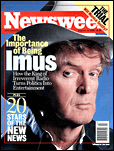The American economy is strong, and U.S. military power still protects those in Eastern and Central Europe.
By Michael Elliott

The Euro: No Worries in Washington
![]()
The American economy is strong, and U.S. military power still protects those in Eastern
and Central Europe.
![]()
By Michael Elliott
![]()
All the best parties end with hangovers; just ask the bankers and currency dealers who started the week guzzling champagne on a Monday morning to celebrate the first day's trading of the euro, the world's newest currency. Within hours, stocks across Europe had soared (bring another bottle!) and the euro's value against the dollar had risen sharply. Europhoria, alas, didn't last; by the end of Friday, the currency was trading at around $1.16, down about 3 percent from the high point it had reached at the beginning of the week, and the champagne was back on ice.
Still, the week had been fun while it lasted; partly because nobody knew quite what the birth of the euro meant. "It's an exciting moment," said Michael Mandelbaum of the Johns Hopkins University's School of Advanced International Studies, "but we really don't know how it's going to turn out." Confusion, indeed, was the order of the day. In Washington, administration officials welcomed the new currency, as they always have done when asked. They didn't get much thanks; in an interview with Le Monde, French Prime Minister Lionel Jospin pointedly said that one of the virtues of the euro was that it enabled Europe to "escape the domination of the dollar." At the weekend, the old greenback seemed to be collecting enemies; on a visit to Paris, Japanese Prime Minister Keizo Obuchi reportedly told French leaders that the "dollar-oriented world needs to change." And the governor of the Cuban central bank welcomed the euro because it would "undermine the dollar's hegemony, for the good of mankind."
In truth, it's just too early to say what the euro means for the dollar. At present, more than half of all world trade is denominated in dollars, though the United States accounts for only about a quarter of world output. Nobody doubts that, in time, a substantial chunk of trade will be done in euros, or that central banks around the world will convert some of their holdings from dollars to the new currency. A reduced demand for dollars, in one view, would make it less easy for the United States to finance its trade deficit; that, in turn, might require higher American interest rates in order to win back foreign demand for dollars. On the other hand, when the American economy posts the numbers that it showed last week—the lowest unemployment rate for 40 years, combined with extraordinarily low inflation—it looks strong enough to win the support of investors the world over.